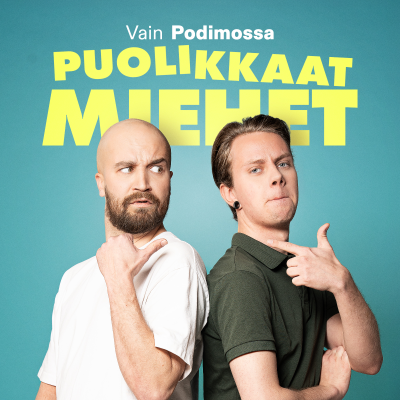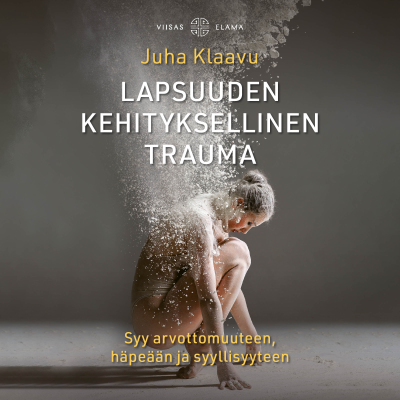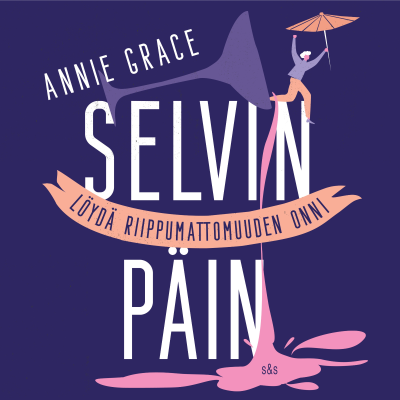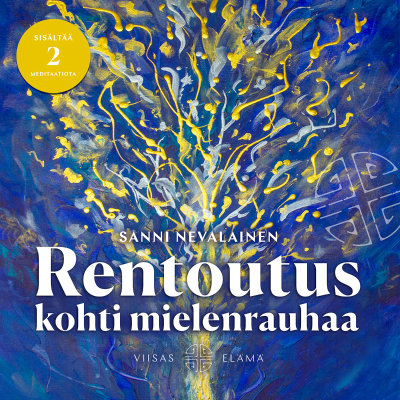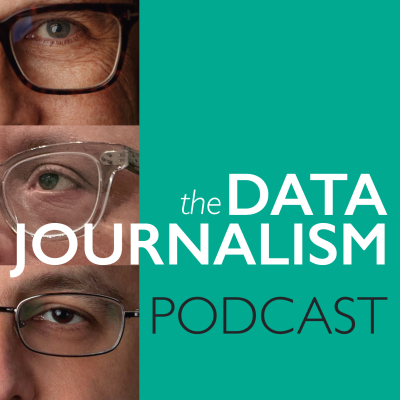
The Data Journalism Podcast
englanti
Uutiset & politiikka
14 vrk ilmainen kokeilu
Kokeilun jälkeen 7,99 € / kuukausi.Peru milloin tahansa.
- Podimon podcastit
- Lataa offline-käyttöön
Lisää The Data Journalism Podcast
Hosts Alberto Cairo, Simon Rogers and Scott Klein will explore the latest in data journalism. You will meet the world’s top data journalists - and you will find out how they do what they do. Subscribe to see how data is changing the world of journalism forever.
Kaikki jaksot
50 jaksotData journalism in the face of ICE and subzero temperatures in MN
MaryJo Webster [https://www.maryjowebster.com/] is data editor at the Minnesota Star Tribune. She joins Alberto, Scott and Simon to talk about her team’s ongoing coverage of federal immigration troops deployed in Minnesota. They discuss analyzing data in a breaking news environment, and what reporters in other places can learn from the Star Tribune’s approach. Subscribe to the Minnesota Star Tribune [https://www.startribune.com/subscribe] to read more of their coverage. Work mentioned in the episode: * Homeland Security presence in Minnesota dwarfs Twin Cities’ largest police forces [https://www.startribune.com/how-ice-numbers-compare-to-twin-cities-largest-police-forces/601562617] * Wave of immigrants file lawsuits to fight ICE detention [https://www.startribune.com/wrongful-detainment-complaints-spike-during-ice-surge/601567955] * The Trump administration calls them the ‘worst of the worst.’ Here’s what we found. [https://www.startribune.com/the-trump-administration-calls-them-the-worst-of-the-worst-heres-what-we-found/601555390] * Deportation Data Project [https://deportationdata.org/index.html] * TRAC immigration records [https://tracreports.org/immigration/] * Data Mindset for Editors course [https://journalismcourses.org/product/data-mindset-for-editors/] The music this episode, made with TwoTone [https://datavized.github.io/twotone/], represents Google searches for “Minneapolis” in recent weeks. The Data Journalism Podcast is produced by Ozzy Llinas Goodman. Do you have a new data-driven story or project coming up? Tell us about it at datajournalismpodcast@gmail.com [datajournalismpodcast@gmail.com], and we might feature it on the show. Subscribe to make sure you never miss an episode!
A Look Ahead to 2026
As a new year begins, Alberto, Scott and Simon reflect on the broader state of the industry. They discuss dataviz favorites from 2025, what they're working on in 2026, and thoughts on the upcoming year in data journalism. Work mentioned in the episode: * Computation + Journalism conference [https://cplusj2025.com/] * "Organ Transplant System 'in Chaos' as Waiting Lists Are Ignored" [https://www.nytimes.com/interactive/2025/02/26/us/organ-transplants-waiting-list-skipped-patients.html] * "The Legislative Network Behind State Trans Laws" [https://cj-robinson.github.io/trans-model-leg/] * Copy, Paste, Legislate project [https://publicintegrity.org/topics/politics/state-politics/copy-paste-legislate/] * "The Men Trump Deported to a Salvadoran Prison" [https://projects.propublica.org/venezuelan-immigrants-trump-deported-cecot/] * "Buildings wrapped in solid gasoline" [https://www.reuters.com/graphics/BUILDING-FIRES/byprqyryzve/] * Scott’s Nieman prediction [https://www.niemanlab.org/2025/12/show-your-work-makes-a-triumphant-return/] * Empire of AI by Karen Hao [https://www.penguinrandomhouse.com/books/743569/empire-of-ai-by-karen-hao/] * The AI Con by Emily M. Bender and Alex Hanna [https://www.harpercollins.com/products/the-ai-con-emily-m-benderalex-hanna?variant=43065101189154] * Predatory Data by Anita Say Chan [https://www.ucpress.edu/books/predatory-data/paper] * Disabling Intelligences by Rua M. Williams [https://link.springer.com/book/10.1007/978-3-032-02665-1] * AI Engineering by Chip Huyen [https://www.oreilly.com/library/view/ai-engineering/9781098166298/] * What We Ask Google by Simon Rogers (!!) [https://www.penguinrandomhouse.com/books/798252/what-we-ask-google-by-simon-rogers/] * Open Visualization Academy [https://openvisualizationacademy.org/] * CUNY AI Journalism Builders Lab [https://www.journalism.cuny.edu/j-plus/ai-journalism-labs/] The music this episode, made with TwoTone [https://datavized.github.io/twotone/], represents Google searches for "data storytelling" overtaking those for "data journalism." The Data Journalism Podcast is produced by Ozzy Llinas Goodman. Do you have a new data-driven story or project coming up? Tell us about it at datajournalismpodcast@gmail.com [datajournalismpodcast@gmail.com], and we might feature it on the show. Subscribe to make sure you never miss an episode!
Launching the Trans News Initiative
The Trans News Initiative [https://transnewsinitiative.org/] is a new project that tracks and analyzes news coverage of trans communities in the U.S. Our very own Alberto Cairo helped create it, and this week we're joined by three other guests who made it happen: Kae Petrin, Caitlyn Ralph, and Jan Diehm. Check it out at TransNewsInitiative.org [https://transnewsinitiative.org/]. Caitlyn Ralph [https://caitlynmralph.github.io/] is the studio director and partner at Polygraph [https://polygraph.cool/], The Pudding [https://pudding.cool/]'s in-house agency. Jan Diehm [https://pudding.cool/author/jan-diehm/] is a journalist-engineer at The Pudding. Kae Petrin [https://petrinkae.github.io/] is a data and graphics reporter for Civic News Company [https://dataviz.chalkbeat.org/]. The music this episode was made with TwoTone [https://datavized.github.io/twotone/], based on data from the Trans News Initiative. The Data Journalism Podcast is produced by Ozzy Llinas Goodman. Do you have a new data-driven story or project coming up? Tell us about it at datajournalismpodcast@gmail.com [datajournalismpodcast@gmail.com], and we might feature it on the show. Subscribe to make sure you never miss an episode!
Breaking New Ground with the Straits Times
The Straits Times is Singapore’s most widely read print newspaper, and its online presence is full of innovative data visualization projects. Our guests this week — Charlene Chua, Hannah Ong, and Stephanie Adeline — are three of the young journalists making it happen. They join us to discuss their work and how the Straits Times became such a powerhouse of data journalism. Charlene Chua [https://www.straitstimes.com/authors/charlene-chua], Hannah Ong [https://www.straitstimes.com/authors/hannah-ong], and Stephanie Adeline [https://www.straitstimes.com/authors/stephanie-adeline] are members of the digital graphics team at the Straits Times [https://www.straitstimes.com/global]. Their work has recently won awards from the Singapore Press Club, the Society for News Design, and the Society of Publishers in Asia. Work mentioned in the episode: * Climate change: How Singapore is saving its shores from rising sea levels [https://www.straitstimes.com/multimedia/graphics/2022/01/singapore-protect-sea-levels-rise/index.html] * How hawker signboards tell the story of Singapore [https://www.straitstimes.com/multimedia/graphics/2025/09/singapore-hawker-signs/index.html?shell] * Flight of the common rose: How are Singapore’s butterflies impacted by climate change? [https://www.straitstimes.com/multimedia/graphics/2024/12/singapore-butterflies-climate-change/index.html?shell] * How accessible is Singapore? We travel with a wheelchair user to find out. [https://www.straitstimes.com/multimedia/graphics/2024/10/accessibility-in-singapore/index.html] * Inside the confusing world of women’s clothing sizes [https://www.straitstimes.com/multimedia/graphics/2025/09/womens-clothing-size-guide-singapore/index.html?shell] * Why handwriting matters [https://www.straitstimes.com/multimedia/graphics/2025/06/why-handwriting-matters/index.html] The music this episode, made with TwoTone [https://datavized.github.io/twotone/], represents the predicted sea level rise in Singapore by the year 2100. The Data Journalism Podcast is produced by Ozzy Llinas Goodman. Do you have a new data-driven story or project coming up? Tell us about it at datajournalismpodcast@gmail.com, and we might feature it on the show. Subscribe to make sure you never miss an episode!
Charts as Political Theater
Not since Ross Perot’s famous TV presentations using cardboard charts have we had a national figure who uses data visualization props quite like Donald Trump. This week, Philip Bump joins Scott and Simon to talk about Trump’s use of data, and how politicians more generally approach information visuals. Plus, they discuss Philip’s background, how he measures success as a solo blogger, and the future of AI in data journalism. Philip Bump was a columnist at the Washington Post [https://www.washingtonpost.com/people/philip-bump/] for more than a decade, where he wrote the newsletter “How To Read This Chart.” Since leaving the Post, he’s continued to cover data in all kinds of interesting ways on his blog, pbump.net [http://pbump.net]. His 2023 book, The Aftermath [https://www.pbump.com/], covered the future of power as the baby boom generation recedes. Work mentioned in the episode: * 9/12 rallies visualization [https://web.archive.org/web/20120306052421/http://pbump.net/912.html] * Monty Hall problem simulator [https://pbump.net/montyhall/] (more info on the Monty Hall problem here [https://web.archive.org/web/20130121183432/http://marilynvossavant.com/game-show-problem/]) * “How Trumpworld inflates the perceived danger of the left” [https://www.pbump.net/o/how-trumpworld-inflates-the-perceived-danger-of-the-left/] * Ross Perot using charts on C-SPAN [https://www.youtube.com/watch?v=jaFUSLaQUHo] * Philip’s coverage of Trump’s Hurricane Dorian chart [https://www.washingtonpost.com/politics/2019/09/05/trumps-insistence-that-his-incorrect-alabama-tweet-was-correct-tips-into-orwellian/] * Philip’s coverage of Trump’s immigration chart from May 2024 [https://www.washingtonpost.com/politics/2024/05/23/look-trumps-misleading-inaccurate-graph-us-immigration/] and October 2024 [https://www.washingtonpost.com/politics/2024/10/24/trump-biden-immigration/] * Trump and Stephen Moore presentation on BLS data [https://www.c-span.org/program/white-house-event/president-trump-gives-remarks-on-the-economy/663941] * Axios interview with Trump on Covid numbers [https://www.axios.com/2020/08/04/trump-coronavirus-under-control] The music this episode, made with TwoTone [https://datavized.github.io/twotone/], represents votership in US presidential elections since 1856. The Data Journalism Podcast is produced by Ozzy Llinas Goodman. Do you have a new data-driven story or project coming up? Tell us about it at datajournalismpodcast@gmail.com, and we might feature it on the show. Subscribe to make sure you never miss an episode!
Valitse tilauksesi
Premium
Podimon podcastit
Lataa offline-käyttöön
Peru milloin tahansa
14 vrk ilmainen kokeilu
Sitten 7,99 € / kuukausi
Premium
20 tuntia äänikirjoja
Podimon podcastit
Lataa offline-käyttöön
Peru milloin tahansa
30 vrk ilmainen kokeilu
Sitten 9,99 € / kuukausi
Premium
100 tuntia äänikirjoja
Podimon podcastit
Lataa offline-käyttöön
Peru milloin tahansa
30 vrk ilmainen kokeilu
Sitten 19,99 € / kuukausi
14 vrk ilmainen kokeilu. Kokeilun jälkeen 7,99 € / kuukausi. Peru milloin tahansa.
















